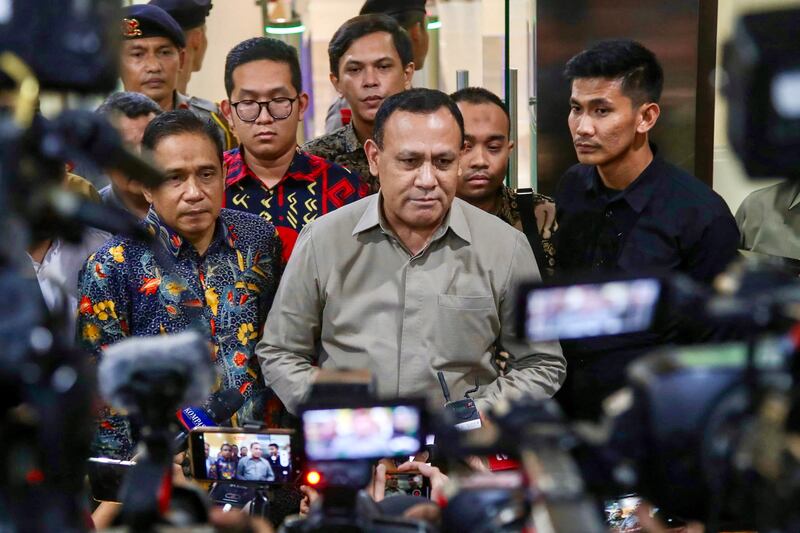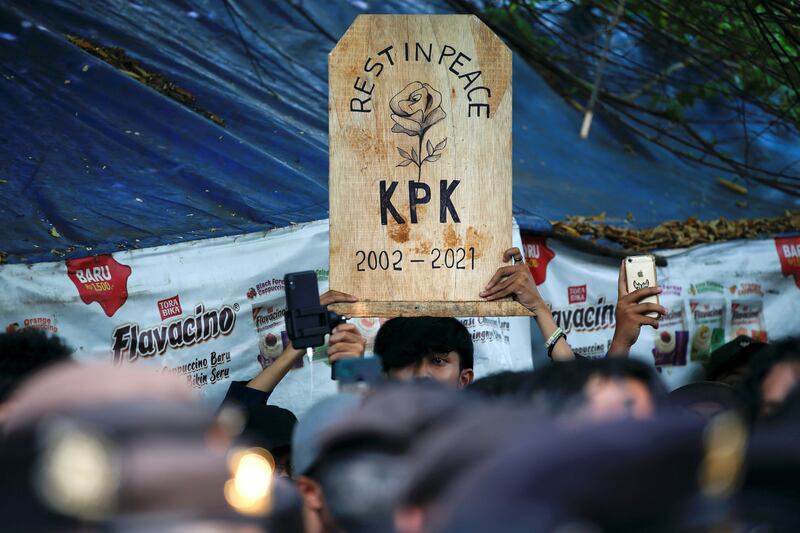Indonesian prosecutors on Wednesday described in court how a former agriculture minister allegedly forced his staff to steal 20% of the ministry’s budgeted funds for his personal use, and threatened to fire them if they didn’t obey him.
As his trial opened at an anti-corruption court in Jakarta, they also charged the ex-minister, Syahrul Yasin Limpo, with extortion and receiving bribes through such coercion totalling 44.5 billion rupiah ($2.8 million).
Syahrul is the sixth cabinet member in President Joko "Jokowi" Widodo's two terms spanning nearly a decade to be embroiled in a graft case, lending credence to criticism that the longstanding blight of corruption had worsened under him.
Syahrul came under the scanner last October after multiple raids on his residences and ministry offices, following which he resigned as minister.
“The defendant, as the minister of agriculture from 2019 to 2023, asked, received, or cut payments from other civil servants or state officials or from the public treasury,” prosecutor Taufiq Ibnugroho said, reading from the charges.
The prosecution alleged that Syahrul had asked his staff to garnish 20% of the budget from every secretariat, directorate and agency at the Agriculture Ministry.
“The officials who opposed him were asked to resign from their jobs,” Taufig told the court.
“The defendant threatened to reassign or dismiss the officials at the first echelon level if they did not meet his demands.”
Taufiq was referring to high-level officials at the ministry, such as the chairperson, secretary general and director general.
Politicization of law alleged
Having coerced them to steal and pass the money on to him, Syahrul is alleged to have used the funds for his personal and family expenses. They included renting planes and taking foreign trips, including a pilgrimage to Mecca.
Prosecutors also charged two of Syahrul’s subordinates and alleged accomplices – Kasdi Subagyono, a ministry secretary-general, and Muhammad Hatta, agricultural equipment and machinery director.
The ex-minister is scheduled to respond to the indictment on March 6. He has said he would cooperate with the authorities. He faces up to 20 years in prison if found guilty.
The prosecution also accused Syahrul of giving 40 million rupiah ($2,244) of the total money he had others pilfer for him to his National Democratic Party (NasDem), according to the indictment.
NasDem treasurer Ahmad Sahroni told the Kumparan news website that the ex-minister gave money to the party for relief work after the 2022 earthquake in Cianjur, a regency in West Java.
In the wake of corruption allegations last May against another member, Johnny Gerard Plate, the former communication and information minister, the party had alleged that the law was being used against it for political purposes.
NasDem had decided to support an opposition candidate in this year’s presidential election, which took place Feb. 14, despite being part of the ruling coalition, and this had displeased them, the party had alleged.
Johnny was sentenced to 15 months in prison in November.

Corruption at ministries is common and hard to detect, according to Wana Alamsyah, a researcher at Indonesia Corruption Watch.
“Whistle blowers at ministries must be protected so that they do not become victims of intimidation such as being transferred or have their careers ended,” he told BenarNews.
He said he hoped Syahrul would be adequately punished if found guilty.
“Law enforcement also needs to seize assets that are suspected to come from corruption crimes.” Wana said.
Corruption is so pervasive in Indonesia because it persists at the highest levels, critics say.
For instance, no less a personage than the former chief of the national Corruption Eradication Commission (KPK) has also been accused of demanding bribes – from none other than former agriculture minister Syahrul.
The KPK chief Firli Bahuri is accused of extorting Syahrul while investigating the corruption case.
Firli was charged with extortion, and dismissed from his job in December, though he remains free while awaiting trial and has failed to show up for police questioning several times.

The KPK once stood as a beacon of hope in Indonesia’s struggle against entrenched corruption. But its reputation has been marred in recent years by what activists believe to be political interference.
In particular, KPK's independent reputation was tarnished after the passage of a 2019 law to reform the agency. Passed under President Jokowi's watch, the law curbed the KPK's investigative powers.
It also mandated that employees take a civics test, which critics alleged was designed to get rid of the agency's veteran investigators. In 2021, dozens of employees and senior investigators were sacked after failing this test.
Indonesia ranks an abysmal 115th out of 180 nations in the 2023 Corruption Perceptions Index compiled by Transparency International.
The index measures how corrupt each country’s public sector is perceived to be, according to experts and businesspeople.
